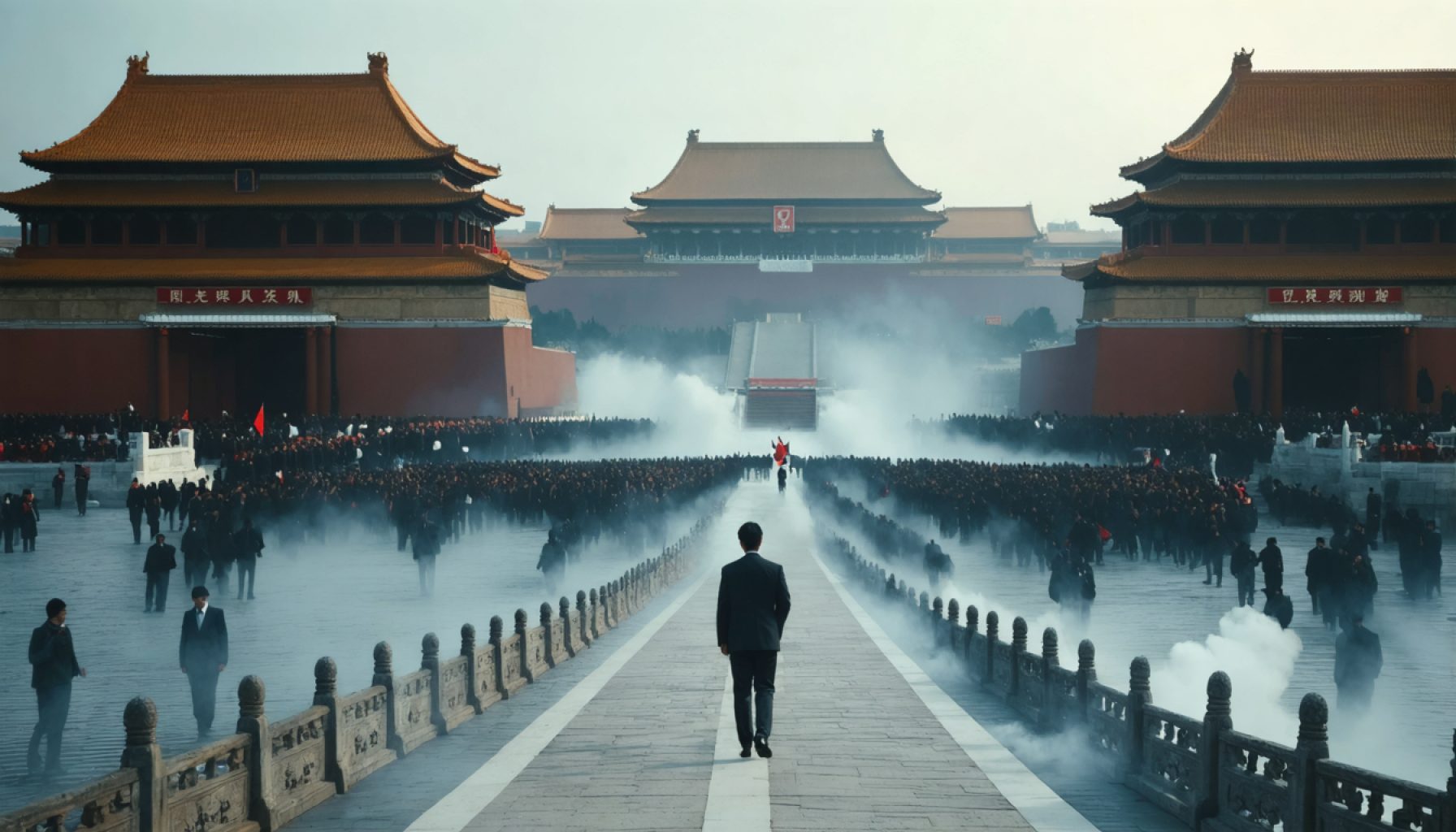- Jiang Chaoliang, a prominent figure in Chinese politics, is under investigation for serious alleged breaches of discipline and law.
- Once respected for his roles as Governor of Jilin and Party Secretary of Hubei, Jiang’s career faces significant scrutiny.
- As Deputy Director of the Agriculture and Rural Affairs Committee, his achievements now clouded by uncertainty, reflect China’s political accountability.
- This situation highlights the Chinese Communist Party’s focus on accountability, emphasizing the delicate balance between power and responsibility.
- The case prompts reflection on the transient nature of power and its implications for China’s political landscape.
Amid whispered conversations in China’s political landscape, a storm brews as a once-respected figure stands on the precipice of scrutiny. The rise and sudden pause of Jiang Chaoliang’s career captures attention across the nation. Born in the bustling city of Shanghai in August 1957, his journey through the intricate realm of Chinese politics was marked by ambition and perceived integrity. Over the decades, he held significant roles, such as the governor of Jilin Province and the Party Secretary of Hubei, weaving his influence through the fabric of regional development and governance.
However, amidst his tenure as the Deputy Director of the Agriculture and Rural Affairs Committee for the 14th National People’s Congress Standing Committee, shadows have emerged. Officials have initiated an investigation into serious alleged breaches of discipline and law, casting a cloud over his achievements. The very corridors that once echoed with endorsements now resonate with uncertainty and cautious speculation.
In the labyrinth of power, where political chess games are a staple, Jiang’s situation underscores the tightened grips of accountability and vigilance within the Chinese Communist Party. Such developments serve as poignant reminders of the delicate balance between power and responsibility, even for those who roamed its summit with apparent ease.
The unfolding narrative of Jiang Chaoliang invites the audience to reflect on the broader implications for China’s political dynamics. Power remains elusive and transitory, reinforcing the adage that it is not just the ascent that defines legacy, but the quality of one’s stewardship and the consequences faced under scrutiny. One question lingers: How will this evolving tale reshape the narrative of political accountability in China?
The Untold Twists and Turns in Jiang Chaoliang’s Political Saga
Exploring the Investigation and Political Implications
The political landscape in China is marked by stringent discipline and a robust anti-corruption drive under the leadership of the Chinese Communist Party (CCP). Jiang Chaoliang’s career halt due to investigations into alleged breaches illuminates the ongoing crackdown on political misconduct. This section explores how such investigations are conducted and their implications for political figures in China.
How Political Investigations Are Conducted in China
1. Initiation: The Central Commission for Discipline Inspection (CCDI) or the National Supervision Commission initiates probes based on internal reports, whistleblower tips, or oversight audits.
2. Preliminary Review: A preliminary review determines whether full-fledged investigations are warranted. This often involves discreet inquiries and surveillance.
3. Formal Probe: A formal investigation involves a suspension from duties, followed by detailed interrogations and evidence collection. The accused may face detention during this phase.
4. Judicial Process: If evidence is substantial, the case is transferred to judicial authorities for prosecution. Trials and sentencing follow legal processes stipulated by Chinese law.
Real-World Use Cases and Market Forecasts
China’s political atmosphere significantly influences its socioeconomic landscape, affecting foreign investments and market stability. High-profile investigations signal rigorous oversight, fostering a somewhat cautious yet stable investment climate.
– Investment Context: Foreign investors may perceive intensified regulatory scrutiny as a safer environment to protect capital against unethical practices. However, uncertainty regarding political figures can lead to temporary market volatility.
– Industry Trends: The anti-corruption campaign continues to shape corporate governance, urging companies to align with lawful practices and enhance transparency in operations.
Comparative Analysis: Political Accountability
Political accountability under the CCP shows parallels with other nations pursuing zero tolerance against corruption. However, China’s centralized power structure and emphasis on party discipline render its model unique. Unlike democratic systems where independent entities conduct probes, China’s centralized investigations reflect party control over proceedings.
Pros & Cons Overview
Pros:
– Enhanced Accountability: The crackdown promotes integrity and accountability among government officials.
– Reduced Corruption: Persistent efforts deter unethical practices within state organs.
– Stability and Trust: The drive may build investor confidence over time, portraying a stable economic environment.
Cons:
– Political Instability: High-profile probes can trigger short-term political uncertainty.
– Perceived Authoritarianism: The consolidation of power and oversight may evoke concerns about limited freedom and transparency.
– Market Volatility: Investors may react cautiously amid sudden political shifts.
Actionable Recommendations
– For Political Observers: Stay informed on CCP announcements and official reports for insights into China’s evolving political strategies.
– For Investors: Diversify investments and be prepared for minor fluctuations influenced by political updates.
– For Businesses: Enhance compliance and transparency to align with regulatory trends moving towards stricter governance.
Insights & Predictions
Given China’s sustained commitment to rooting out corruption, similar probes into other political figures are anticipated. Jiang Chaoliang’s case highlights a vigilant yet volatile atmosphere, demanding strategic navigation for those involved in Chinese markets.
Readers interested in Chinese politics and market trends might consider bookmarking the following reliable source for consistent updates on governance and policy shifts: Council on Foreign Relations.
This landscape evolves rapidly, posing both challenges and opportunities—understanding its fabric is crucial for anyone engaging with China on a political or economic front.
